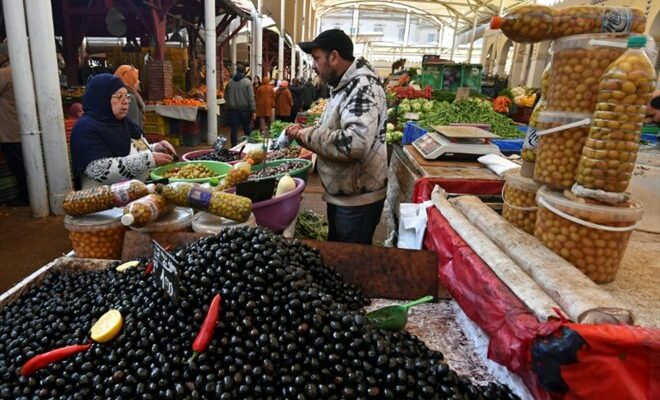People in front of a vegetable stall at a market in Tunis, March 6, 2024 (AFP/FETHI BELAID)
“This is the first time I’ve bought fruit and vegetables by the piece,” confides a retiree doing her shopping. Faced with the high cost of living, Tunisians are tightening their belts for Ramadan, a month of fasting but also of festive nightly meals with family.
Usually, Tunisians prepare for the holy month by stocking up on large quantities of basic foods, but this year, soaring prices, against a backdrop of recession and rising unemployment, are seriously affecting their purchasing power.
“I’m not poor but I can’t do it anymore! My pension doesn’t allow me to cover my needs,” Fayka, a 65-year-old retiree who prefers to keep her last name quiet, told AFP at the Bab El Fellah market. , in Tunis, very popular with the popular classes.
She now deprives herself of red meat, the price of which exceeds 40 dinars (more than 12 euros) per kilo in a country where the average salary is 1,000 dinars per month (around 300 euros).
“Today, I can only buy low-end merchandise and what’s more, by the piece,” she laments. “The situation has never been so difficult and stifling. I have to queue for some products (subsidized by the state, editor’s note) and pay excessive electricity and water bills, sometimes late,” he says. She.
Mohamed Doryi, a 69-year-old vegetable seller, no longer displays his prices to avoid scaring away customers. “At this time in the past, you wouldn’t have been able to set foot in the market because it was so crowded, which is not the case today,” he says.

Fruit and vegetable stalls at a market in Tunis, March 6, 2024 (AFP/FETHI BELAID)
Tunisia, which has 12 million inhabitants, a third of whom live below the poverty line, has suffered high inflation for two years (10% on average per year) with food prices which have sometimes tripled.
Growth, restarting after Covid, ran out of steam last year (at 0.4%) due to a serious drought which decimated the harvests. The country even entered recession at the end of 2023 and unemployment started to rise again (16.4% at the end of 2023 compared to 15.2% a year earlier).
The country has also been shaken by political tensions since the president, Kais Saied, granted himself full powers in July 2021.
– “Stagflation” –
In a butcher’s shop, a fifty-year-old timidly orders 150 grams of veal. “My husband recently passed away and I can’t afford to buy more,” she whispers to the seller.

Women buy fish in a market in Tunis, March 6, 2024 (AFP/FETHI BELAID)
“There are more and more people asking for two dinars (around 60 cents) of minced meat (less than 100 grams) or 1.5 dinars of merguez. I can’t say no to them. People are exhausted,” explains Mustapha Ben Salmane, a 52-year-old butcher, also saying he is “tired of the situation”.
According to him, “most people are going through financial difficulties. Salaries were paid before Ramadan and (the next ones) will only arrive shortly before Eid (around April 10). Therefore, most people find themselves without income” while Ramadan, usually synonymous with sumptuous family dinners, has not yet started.
For economist Ridha Chkoundali, “economically speaking, we are experiencing a period of stagflation, that is to say a fall in growth and a rise in inflation” which has “a double effect on purchasing power of Tunisians”, causing “real incomes to fall”.
Among the causes, the economist cites “the deliberate choice of public authorities to prefer to repay debts, especially external debts, to the detriment of supplying the market with basic foodstuffs and agricultural inputs” (fertilizers and fodder).
In Tunisia, it is the State which centralizes the purchases of subsidized products and the lack of money in public coffers — also burdened by the salaries of more than 650,000 civil servants — regularly causes shortages of flour, rice, sugar or semolina.

Fruit and vegetable stalls at a market in Tunis, March 6, 2024 (AFP/FETHI BELAID)
Tunisian banks are also in great demand to finance the country’s debt (80% of GDP), which undermines their ability to lend to the private sector and small and medium-sized enterprises (SMEs).
The lack of resources also results from “the choice to break with the IMF”, estimates economist Chkoundali. President Saied rejected last year a pre-agreement concluded with the International Monetary Fund for a new loan of two billion dollars, describing the reforms associated with obtaining it as “diktats”.
© 2024 AFP
Did you like this article ? Share it with your friends using the buttons below.




